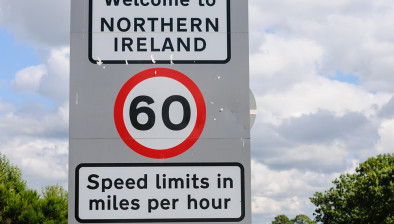NI: High Court: Department of Education must reconsider provision of transport for Irish-medium school
An Irish-medium secondary school has been successful in its application for judicial review in the High Court, where it was found that the Department of Education failed to give proper weight and consideration to its obligation pursuant to Art 89 of the Education (Northern Ireland) Order 1998 to encourage and facilitate the development of Irish-medium education.

About this case:
- Judgment:
Finding that the Department had to give further consideration to the issue of providing transport, Mr Justice Treacy said that the Department’s duty to facilitate and encourage Irish-medium education was not “merely aspirational”.
Background
Coláiste Feirste is the only full-immersion Irish-medium language secondary school in Northern Ireland. In the High Court, Colma McKee as Vice Chairperson of the Board of Governors of Coláiste Feirste brought an application for judicial review based on the contention that the Department of Education Northern Ireland refuses to provide adequate transport or transport assistance for pupils and prospective pupils of Coláiste Feirste living in rural areas of Northern Ireland and in the Greater Belfast area.
Sitting in the High Court, Justice Treacy explained that “the primary schools which form the catchment area for Coláiste Feirste are widely geographically dispersed”, differentiating it from other second level schools where the catchment primary schools are usually much more proximate. While this has obvious implications for the provision of transport to those who wish to attend Coláiste Feirste, the Department’s transport policy reflects the pattern of transport needs for the established sectors in Northern Ireland.
The Department’s principal reason for declining to accommodate the transport demands are economic, consistent with “the avoidance of unreasonable public expenditure” pursuant to Article 44 of the Education (Northern Ireland) Order 1998. It was also stated that granting further transport assistance would “set a precedent that would invite similar requests from all sectors”.
Application for judicial review
In the High Court, Coláiste Feirste were granted leave to apply for judicial review on the following grounds:
Duty imposed by Article 89 not ‘merely aspirational’
Considering “the nature of the duty imposed by Art 89 of the 1998 Order and the impact, if any, on the further duties enshrined in Art 44 and Art 52 of the 1986 Order”, Justice Treacy said that Art 89 was “the statutory embodiment of the clear commitment enshrined” in the Good Friday Agreement to place a statutory duty on the Department to encourage and facilitate Irish medium education in line with the current provision for integrated education.
Justice Treacy rejected the Department’s contention that this duty was “merely aspirational”, and said that the “imposition of the statutory duty has and is intended to have practical consequences and legislative significance”.
As such, it did not follow that the proper discharge of this duty would “set a precedent” in respect of other education sectors where this statutory duty was not owed – the Department does not have a corresponding duty to the traditional established educational sector, therefore it can “facilitate and encourage” the Irish-Medium post-primary sector by taking positive steps or removing obstacles which inhibit the statutory objective. Justice Treacy said that these steps did not have to be taken for other sectors, and that this did not appear to have been “fully appreciated” by the Department.
Finding that the Department had “failed to give proper weight and consideration to its obligation” under Art 89 of the 1998 Order to encourage and facilitate the development of Irish-Medium education; Justice Treacy was satisfied that the first ground had been made out and the Department of Education must “give further consideration to the transport issue in the post primary Irish medium education sector”.
Consideration of further grounds
Justice Treacy was not satisfied that the second ground (discrimination) had been made out. Considering the third ground, Justice Treacy rejected the Department’s submission that Art 89 of the 1998 Order had “no relevance to or impact upon Art 52” of the 1986 Order. Justice Treacy said that the provision of transport facilities to schools was critical to the development of any sector and the provision of genuine parental choice. As such, it was “open to” the Department to exercise its powers under Art 52 to amend the transport policy in the discharge of its duty under Art 89.
The Department submitted that Ms McKee was not a victim under s.7 of the Human Rights Act 1998, and therefore had no standing to maintain this aspect of the application for judicial review. Justice Treacy explained that Ms McKee did not identify as a parent or prospective parent of a child at the school, and consequently there was no interference with her rights. Justice Treacy said there was considerable force in the Department’s submission in this regard (In Re CAJ NIQB 25 and Re NICCY considered), however since a conclusion had already been arrived at regarding the primary submission in Article 89 of the 1998 Order, Justice Treacy said it was unnecessary to reach a concluded view on this issue.
Copyright © Irish Legal News Ltd 2018







